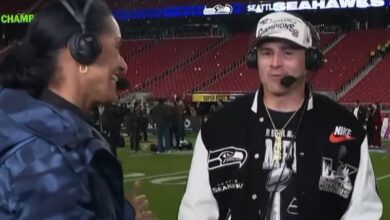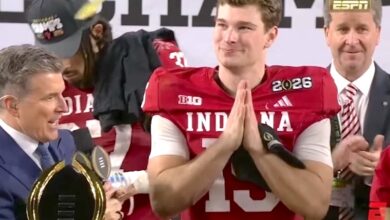PATTY THE MESSENGER – Coach has added more to God’s Kingdom than four national championships
For a few hours on a Thursday afternoon in early March, Oklahoma softball coach Patty Gasso was not in her signature attire — white Nikes, windbreaker pants and jacket, and, of course, a crimson or white visor. On this day, she opted for black heels, dress slacks and a warm, multicolor blouse. The Norman Rotary Club had asked Gasso to be its guest speaker, and she pondered about her presentation later that day as she sat down for an in-person interview with FCA Magazine.
Gasso, sitting at a table in the team room, was surrounded by mementos of her program’s remarkable success. To her right was a wall full of names, all the Sooners she helped become All-Americans. On another wall were photos of the Sooners celebrating each of their four national championships. A College World Series jersey signed by each member of the memorable 2000 team, the first to win a title, was framed and hanging just outside the room’s entrance.
Gasso’s top priority that day, though, was a simple request. She didn’t want her words — even though she told numerous stories — to be interpreted as though it were about her.
In the demanding grind of a long softball season, Gasso understands what happens inside the team room is just as important as what happens on Marita Hynes Field, Oklahoma’s stadium. The team room is where bonding happens. It’s where the Sooners watch film, discuss strategy and hold postgame news conferences.
It’s also where they hold voluntary prayer services, Bible discussions and chapel services before their Sunday games.
“I feel like I’ve arrived,” said Gasso, the Hall of Fame coach now in her 28th season. “I’ve figured out what my purpose is here. Many people, probably 99 percent, believe my purpose here is to win. And I get that. But I’m winning in other ways; our team is winning in other ways behind the scenes.”
Gasso started with a story about a softball game in 1992. She was the coach at Long Beach City College, standing in the third-base coaching box.
“I’ll never, ever forget,” she said. “I think this was absolutely God’s plan.”
During the game, Gasso waved her left arm to signal her player to round third base and sprint home. In that moment, she felt and understood the Holy Spirit. Filled with joy from accepting God’s grace in that specific time and place, she sprinted home after the game and told her husband, Jim, who helped introduce her to Jesus Christ.
“From that moment on,” she said, “my whole world changed.”
The moment was the culmination of a spiritual journey that began in 1983. Gasso transferred to Long Beach State that year as a junior shortstop on the softball team. Jim was a senior who finished his football career as a defensive back the prior semester. The couple, both pursuing degrees in physical education, took some classes together and soon began dating.
Although sports connected them, their exposure to faith during their childhood was different.
Gasso was raised in Torrance, California, and her family attended church only on special occasions. As an adolescent, she kept it hidden from her family that she listened to legendary evangelist Billy Graham.
Jim was raised in the church by his father, Roberto, a minister in Los Angeles. Church was a weekly occurrence in Jim’s life, and he made sure to bring Gasso with him.
But, looking back, both agreed he was a little too persistent in trying to convince Gasso about God.
“I was trying to do God’s work,” he said. “That wasn’t my job.”
After their respective graduations, the couple became coaches — Gasso a softball coach at La Mirada High, and Jim an assistant football and baseball coach at Pasadena City College.
They were married June 21, 1986. Six years into their marriage, following that softball game in 1992, Jim was elated when Gasso began living her faith in full.
“The greatest moment in my life,” he said. “This is the person God gave me, and now I get to be in heaven with her forever.”
• • •
When Gasso began coaching at Long Beach City College, she wanted to do for her student-athletes what her mother, Janet Froehlich, did for her. Gasso learned sports through her mother. Together, they listened to broadcaster Vin Scully call Los Angeles Dodgers games.
Froehlich, a single mother working as a central services technician, raised her three children through hard work and tenacity. Living next to a large park with softball fields, she would come to the park from work in her skirt and heels and teach her children about life through sports.
“It was cool that she was my coach, and I thought it would be really cool if this could be a profession,” Gasso said. “I knew there were women coaches out there, but you never really saw them because they weren’t on TV.”
“That’s when God really made it clear, ‘You need to stay here, and this is where you need to do My work.” — Patty Gasso.In the park, Gasso described herself as similar to Benny “The Jet” Rodriguez, the memorable character from The Sandlot. On her sandlot, other children looked up to Gasso. She was a leader, the first time in her life she held such a role.
At Long Beach City College, Gasso learned the lasting impact she could have on her student-athletes. She received spiritual guidance from Shelley McCall, her assistant, and career guidance from Mickey Davis, the athletic director. One year, Gasso and Davis attended the College World Series, held annually in Oklahoma City. Gasso was enthralled.
“There were maybe 1,500 people in the stands,” she said. “It was unbelievable to see that many people watching a softball game. I sat there and wanted to be there one day.”
Davis introduced Gasso to Marita Hynes, the former Oklahoma coach who was an administrator in the athletic department. A few years later, in 1995, Hynes offered Gasso the Sooners job. Despite some doubts, Gasso accepted. She took less money than she was making at Long Beach City College. The Sooners didn’t even have their own field, instead playing at Reaves Park on the city’s schedule. At the time, no one — including Gasso — was confident she would be a long-term solution.
“Honestly, I did not meditate in prayer over this enough,” she said. “I was mad at myself for letting my ego take over for more of what I wanted in my career. I wanted the opportunity so much, but I was scared to death.”
Pregnant with her youngest son, D.J., Gasso sat in the living room of her empty house in California, blocks from the beach, and her conflicting emotions overtook her. She wept. Jim told his wife it was time for them to put their faith in Christ.
“I prayed,” he said, “and I told Patty, ‘I’m behind you.’”
- • •
Gasso, during the 1997 season, invited her players to a voluntary weekly Bible discussion. Beth Gagliardi and her husband, Vince, the pastor at Calvary Chapel of Norman at the time, led the gatherings with Gasso. In the beginning, two Sooners attended. But, over time, more and more student-athletes began discussing their faith with their coach. Gasso was encouraged when she began seeing her players share their faith with one another.
Perhaps the most pivotal year in Gasso’s career was 2000. Before the season, Gasso felt it would be her last. Jim moved back to California in 1999 to coach soccer at Fullerton Community College. Gasso waned under the demands of a long-distance marriage while raising her two sons, leading the Sooners, and squeezing in time to recruit. Despite her difficulties, the Sooners reached their first-ever College World Series. Fueled by a potent offense, Oklahoma won its final eight games to claim the national championship.
“That’s when God really made it clear,” Gasso said, “‘You need to stay here, and this is where you need to do My work.’ I started to understand that my job is more to open the door for Christ to win souls. It’s not about me.”
After the season, Gasso received a sizable raise, and the school’s administration agreed to renovate the softball complex to make it more state-of-the-art. When Jim’s contract ended in 2003, he returned to Oklahoma and started IntenCity Sports Training Academy.
“He did a lot for me in the way of surrendering his career to allow me to have mine,” Gasso said. “It was probably the biggest decision he made, which really was for me.”
By staying, Gasso became involved with Oklahoma’s FCA Huddle in 2005. She began talking with Sarah Roberts, FCA’s director of women’s ministry in Oklahoma at the time. Gasso eventually asked Roberts to be the Sooners’ chaplain, a position she held for 12 seasons before moving to Atlanta.
“People would rather follow a leader who’s real than one who’s always right,” Roberts said of Gasso. “There’s nobody I’ve worked with who has used their power of influence for Christ, with the platform God has given them, as much as her.”
With each season, Roberts became more of an integral part of the program. She explained to the Sooners what it means for them, as women, to be obedient to Christ. One of Roberts’ most memorable moments came in November 2015 when she baptized Leslie Miller, Callie Parsons and Destinee Martinez in front of their teammates in Gasso’s backyard pool.
Gasso said encouraging the Sooners to reach out to Roberts for their spiritual inquiries was humbling. She surrendered her program to God and watched more of her student-athletes grow in their faith. More conversations started to focus on what it takes to be a godly woman rather than hitting, pitching or fielding techniques.
By 2012, Gasso felt she had the best team in the country. The Sooners reached the College World Series final against Alabama. Before the decisive third game, Gasso said she was more worried about whether she would publicly praise God after the game than the game’s actual outcome.
When the Sooners fell, 5-4, Gasso saw her players cry in the dugout. She found Roberts, who encouraged everyone to give the glory — even in defeat — to God. Then, the Sooners prayed.
In her postgame statement, Gasso, with dry tears on her face, echoed Roberts’ message: “First, we give the glory to God. Win or lose, we give the glory to God.”
Gasso said the heartbreaking defeat that night changed her: “I’m never afraid to say it out loud now.”
- • •

Falepolima Aviu, a 21-year-old junior first baseman and outfielder from Oceanside, California, chose to play at Oklahoma because of Gasso. Aviu learned of Gasso’s faith from watching the College World Series in high school. She felt Gasso was a mother, counselor, mentor and coach in one. Aviu read the Bible growing up, but she was lukewarm in her faith until she arrived in Norman.
“Coach showed me who God is and connected it to softball,” Aviu said. “I felt this is where I belong. I grew up in the church, but I really didn’t feel God’s presence until I got here.”
Aviu was a freshman when, inside the team room, Roberts shared the story in Exodus 17:8-16, how Israel — led by Moses — defeated Amalek’s army.
During the 2016 College World Series, Paige Parker, Oklahoma’s star pitcher, was fatigued from pitching on consecutive days. Roberts explained how Parker was playing the role of Moses, whose arms were fatigued from holding up the staff of God during the battle. Moses received help from Aaron and Hur, who held up his hands, helping lead Joshua to victory. The rest of the Sooners and their fans, Roberts told the team, needed to be like Aaron and Hur in supporting Parker.
“People, through sports, were going home and reading the Bible to find out what we’re doing. Then, they were crying while they did it in the stands.” — Patty Gasso.In the championship series against Auburn, the Sooners frequently lifted their arms up in the air. Whether it was toward Parker after each inning or toward a teammate in the batter’s box, the symbolic gesture helped the Sooners encourage each other. Roberts and Jim explained the gesture to fans, and soon a large portion of the more than 8,000 people inside ASA Stadium were also lifting their arms up in support — in front of a national TV audience.
“People, through sports, were going home and reading the Bible to find out what we’re doing,” Gasso said. “Then, they were crying while they did it in the stands.”
In the decisive third game, behind stellar pitching from Parker, the Sooners won their third championship.
“It was a sense of God’s power allowing us to play free,” Gasso said. “We had no business winning the championship in 2016, and everybody would tell you that.”
A few weeks later, Aviu shared the Sooners’ story with more than 1,000 high school student-athletes during an FCA Camp at UCLA.
Last year, before the regional round of the postseason, Roberts gave her final message as the team chaplain. Inside the team room, she spoke about David’s three mighty men in 2 Samuel 23. Each Sooner, she explained, possessed one of those three men’s qualities — leadership, strength and resilience — and could use it to help the team to victory.
Behind Roberts’ message, another symbolic gesture was created, this time the Sooners held up three fingers — the middle, ring and pinky — during games. Fans flashed the three fingers back to them. The Sooners won 11 consecutive games to win a second straight championship — Gasso’s fourth overall.
Hannah Sparks, a 22-year-old senior catcher from Thomasville, Alabama, joined the Sooners last year after transferring from Northwest Florida State College. Sparks respects Gasso’s sincerity and how she teaches through personal relationships with each student-athlete. Earlier this season, Sparks told Gasso she intends to become a high school teacher and softball coach after she graduates.
“I want to be the kind of coach she is because I want to reach people the way she reaches people,” Sparks said. “When she says it’s not just about softball and she cares for you on a personal level, she steps out and shows that.”
In November, when the Sooners visited the White House to celebrate their championship, Sparks asked President Donald Trump if the team could pray — both with him and for him — during a break between photos. Trump appreciated and accepted. During Sparks’ prayer, Gasso and Jim stood with their heads bowed in awe, grateful of how Christ, through softball, led them to experience such a spiritually powerful moment.
“Once they get into the gospel, God does the rest,” Jim said of the Sooners. “(Patty and I) think about it all the time.”
By Nate Taylor – This story appears in FCA Magazine’s May/June 2018 issue.








